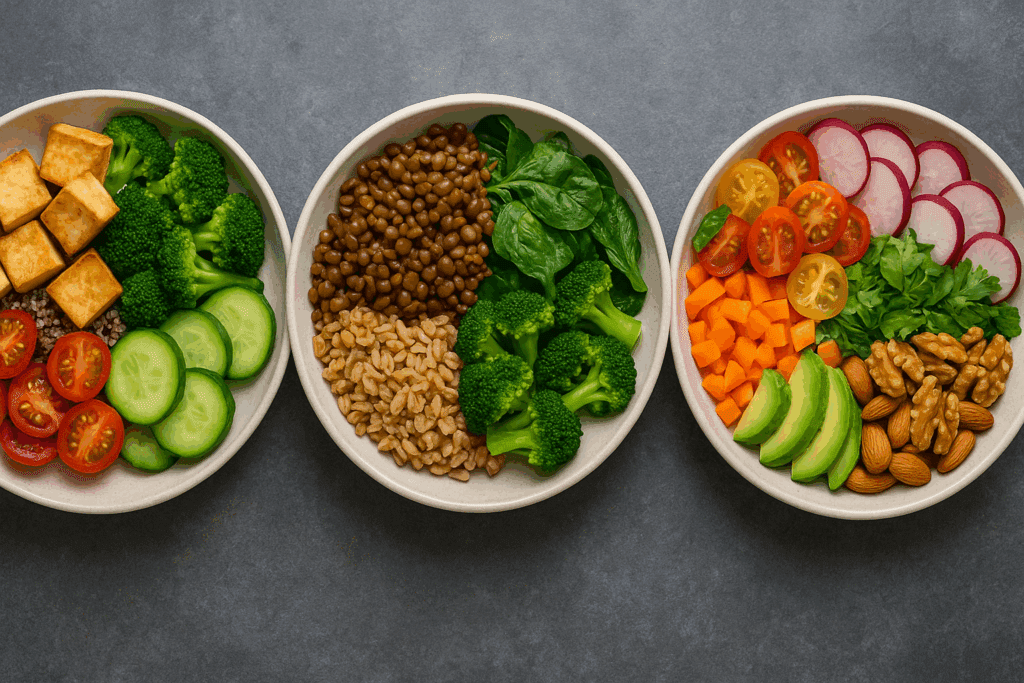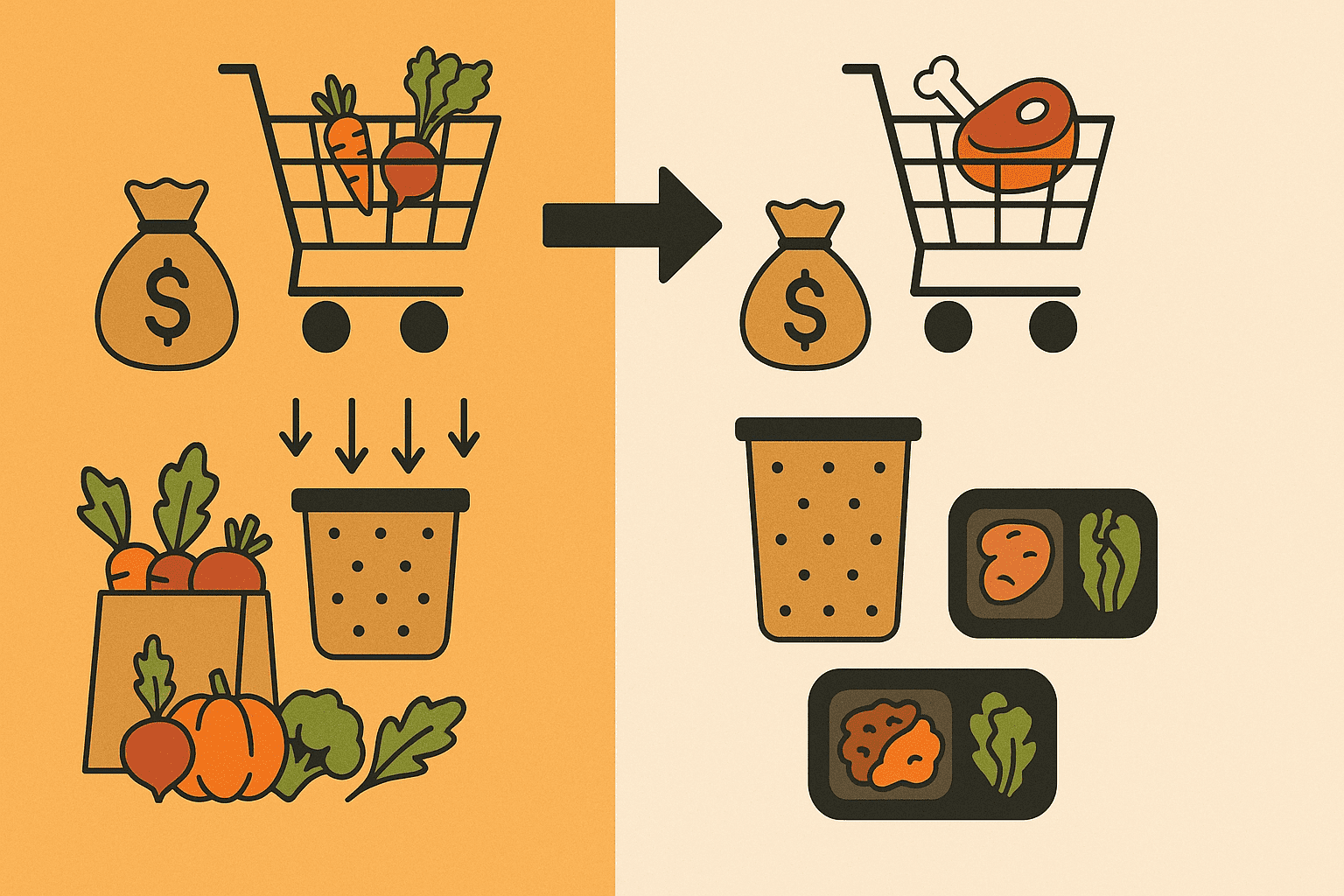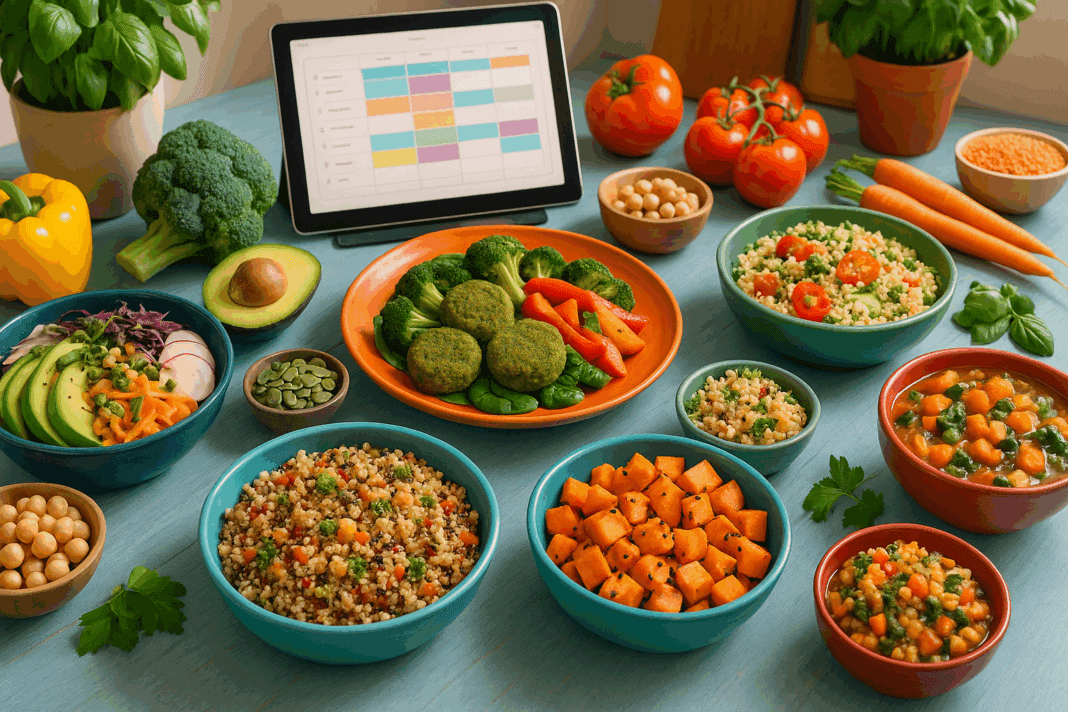The Rising Demand for Smart, Sustainable Eating in a Changing World
In recent years, there has been a profound shift in how people approach their diets. No longer is food merely a source of sustenance—it has become a powerful tool for achieving personal health goals, expressing ethical values, and contributing to planetary sustainability. This growing awareness has fueled the popularity of plant-based eating patterns, with more individuals embracing vegetarianism not just as a dietary choice but as a lifestyle guided by intention, knowledge, and responsibility. In this context, the role of a well-structured vegetarian meal planner has never been more essential.
A vegetarian meal planner serves as both a nutritional compass and a practical guide, allowing individuals to make informed food decisions while staying aligned with their health, budget, and sustainability goals. It replaces guesswork with evidence-based structure and transforms aspiration into action. For health-conscious eaters, especially those navigating busy schedules and financial limitations, a planner offers clarity and confidence in daily food choices. It empowers individuals to build a diet rooted in nutrient-rich whole foods, minimizing processed ingredients and maximizing natural, plant-based variety.
The value of vegetarian eating is no longer confined to niche communities or fringe health circles. Mainstream health organizations such as the American Heart Association and the Academy of Nutrition and Dietetics now recognize vegetarian diets as health-promoting and nutritionally adequate when properly planned. A well-designed vegetarian meal plan has been linked to reduced risks of chronic conditions like heart disease, hypertension, type 2 diabetes, and certain cancers. Moreover, these benefits are not exclusive to those with unlimited grocery budgets or access to gourmet health stores. Even a cheap vegetarian meal plan can provide essential nutrients, robust flavors, and long-term health advantages—if it’s built on solid planning principles.
You may also like: Smart Strategies for Plant-Based Eating on a Budget: How to Nourish Your Body Without Overspending

The Science Behind Plant-Based Meal Planning for Optimal Health
Understanding the science behind a vegetarian meal planner requires more than just listing what foods to include or avoid. It’s about comprehending how the components of a plant-based diet work synergistically to support health at the cellular level. Unlike the standard Western diet, which is often heavy in saturated fats, added sugars, and refined grains, a properly balanced vegetarian menu plan emphasizes fiber-rich vegetables, legumes, whole grains, fruits, seeds, and nuts. These foods are naturally low in cholesterol and packed with phytochemicals, antioxidants, and anti-inflammatory compounds that nourish the body in multifaceted ways.
One of the foundational benefits of adopting a structured vegetarian weekly meal plan is the improvement in metabolic health. Research has shown that diets emphasizing plant-based sources of protein—such as lentils, beans, tofu, and quinoa—can enhance insulin sensitivity and support weight regulation. This effect is partially due to the high fiber content, which slows glucose absorption and reduces spikes in blood sugar. Moreover, plant-based fats, particularly those from avocados, flaxseeds, and walnuts, have been associated with lower levels of LDL cholesterol and triglycerides, contributing to improved cardiovascular outcomes over time.
Another crucial element often overlooked in casual plant-based eating is micronutrient adequacy. A successful vegetarian meal plan pays close attention to nutrients like iron, zinc, calcium, omega-3 fatty acids, and vitamins B12 and D. These are sometimes more challenging to obtain in plant-only diets without careful selection of fortified foods or supplements. A vegetarian meal planner mitigates these risks by ensuring a diverse intake across food groups and incorporating key elements like fortified plant milks, leafy greens, fermented foods, and whole grains like amaranth and farro.
Just as importantly, this kind of structured planning introduces variety and balance into daily eating habits. Without a thoughtful approach, it’s easy to fall into the trap of eating repetitive meals, which can lead to nutrient gaps or mealtime boredom. A dynamic vegetable meal plan rotates seasonal produce and global culinary traditions, bringing excitement to the table without sacrificing nutrition. It transforms eating into a creative act of self-care, rather than a restrictive or monotonous obligation.

Affordability Without Compromise: The Power of a Budget Vegetarian Meal Plan
One of the most persistent myths surrounding healthy eating is that it’s prohibitively expensive. Many consumers associate nutritious, plant-forward meals with costly specialty products, organic-only produce, or artisanal vegan substitutes. However, a well-designed budget vegetarian meal plan can actually lower food costs significantly, especially when meals are based on whole, minimally processed ingredients and bulk pantry staples. The key lies in strategic preparation, smart shopping, and thoughtful storage—all guided by a plan tailored to personal dietary needs and financial constraints.
Staples such as dried lentils, canned beans, rolled oats, brown rice, and seasonal vegetables form the backbone of an affordable, nourishing plant-based diet. These ingredients are not only economical but also rich in fiber, protein, and essential minerals. When purchased in bulk or on sale and prepared in large batches, they enable families and individuals to stretch their grocery dollars further without sacrificing nutritional quality. In fact, studies have shown that diets centered on whole plant foods are often less expensive than meat-based alternatives, particularly when relying on home-cooked meals rather than prepackaged or restaurant fare.
Meal planning also dramatically reduces food waste—an often overlooked contributor to inflated grocery bills. By mapping out weekly meals and shopping accordingly, individuals can ensure that perishable items are used efficiently and leftovers are repurposed into future meals. For example, a pot of vegetable soup made on Monday might serve as dinner again on Wednesday or transform into a grain bowl topping by Friday. This intentional use of ingredients not only supports sustainability goals but also ensures that no nutrient-rich item goes to waste.
A cheap vegetarian meal plan doesn’t require compromising on taste or satisfaction. With a little creativity, even the simplest meals—such as chickpea curry with brown rice, roasted sweet potatoes with black bean salsa, or a stir-fry of tofu and frozen mixed vegetables—can become deeply satisfying, high-nutrient dishes. Incorporating herbs, spices, and homemade sauces adds depth without extra cost, while focusing on in-season produce brings both freshness and affordability. The result is a menu that feels indulgent but remains firmly grounded in financial reality.
Moreover, digital tools and apps make it easier than ever to access a sample vegetarian meal plan suited to a variety of goals and budgets. These tools offer pre-designed weekly meal outlines, grocery lists, and nutritional breakdowns tailored for beginners and experienced meal planners alike. Whether the goal is weight loss, muscle building, improved digestion, or better blood sugar management, there is a vegetarian menu plan available to guide the way. Many of these resources are free or low-cost, making the benefits of structured planning widely accessible.

Nutritional Strategies to Customize Your Vegetarian Menu Plan
Customizing a vegetarian menu plan to fit individual health needs begins with understanding one’s personal dietary requirements, lifestyle, and preferences. There is no universal template that fits everyone perfectly, and that’s precisely why meal planning is so valuable. A personalized approach allows for better adherence, greater satisfaction, and more sustainable long-term results. Whether someone is managing a medical condition, training for athletic performance, or simply aiming to feel more energized throughout the day, a vegetarian meal planner can be tailored to deliver the right balance of macronutrients and micronutrients.
For individuals with higher protein needs—such as athletes or older adults—strategic inclusion of legumes, soy products, seitan, and protein-rich grains ensures adequate muscle support and recovery. At the same time, ensuring a balance between complex carbohydrates and healthy fats supports hormonal health, mood regulation, and long-term energy levels. Rather than relying on packaged vegetarian snacks, a customized plan might incorporate hummus with whole-grain crackers, roasted chickpeas, or almond butter on sprouted bread to support blood sugar stability and nutrient density.
It’s equally important to account for digestive health when creating a vegetable meal plan. High-fiber diets are a hallmark of plant-based eating, but sudden increases in fiber without adequate hydration or gradual adjustment can cause discomfort. A skilled vegetarian meal planner incorporates prebiotic-rich foods like onions, garlic, and asparagus alongside probiotics from fermented items like kimchi or unsweetened yogurt alternatives to maintain gut flora balance. These additions improve nutrient absorption, reduce inflammation, and may even enhance mental clarity due to the gut-brain connection.
For those managing health concerns such as high blood pressure or type 2 diabetes, meal plans for vegetarians can emphasize low-sodium cooking methods, high-potassium foods, and slow-digesting carbohydrates. Swapping white rice for farro or barley, replacing salt with herbs like rosemary and basil, and limiting added sugars while enhancing natural sweetness with fruits can all support health targets without compromising flavor. These modifications help create a sense of empowerment rather than deprivation, reinforcing the idea that food is a form of medicine.

From Meal Planning to Meal Mastery: Turning Intentions into Long-Term Habits
One of the most powerful aspects of using a vegetarian meal planner is the way it transforms short-term dietary intentions into long-lasting, sustainable habits. Many people begin their plant-based journeys with enthusiasm but lose momentum without a clear system to guide their day-to-day choices. That’s where planning becomes a foundational habit—acting not just as a tool for meal selection, but as a framework for long-term lifestyle integration. Rather than relying on impulse, mood, or convenience, a well-thought-out vegetarian meal plan eliminates decision fatigue, promotes intentional eating, and aligns with both health and personal values.
What makes a vegetarian weekly meal plan especially valuable is its ability to introduce structure without rigidity. Flexibility is key for sustainability. While the planner offers a framework, it can and should be adjusted based on changing schedules, seasonal foods, and evolving nutritional needs. For example, someone may start the week with a plan centered on legumes and grains, only to discover midweek sales on fresh produce that inspire a shift toward more stir-fries or salads. A smart planner accommodates such pivots, allowing users to adapt without sacrificing nutritional quality or overspending.
Meal planning also encourages mindful eating, a concept strongly tied to both physical and emotional well-being. When individuals take time to plan meals in advance, they are more likely to select foods that align with their long-term health goals rather than reactive cravings or convenience-driven habits. This is particularly important for those managing weight or metabolic health, as consistent meal patterns support blood sugar stability, hormonal regulation, and digestion. By intentionally creating a vegetable meal plan that includes satisfying, fiber-rich options for every meal, individuals are more likely to stay satiated and reduce the likelihood of overeating or emotional snacking.
Additionally, the process of meal prepping can become a grounding ritual, helping individuals slow down, reconnect with their food, and build a healthier relationship with eating. Preparing ingredients in advance—washing greens, cooking grains, soaking legumes—can be meditative in nature, while also ensuring that healthy choices are easily accessible throughout the week. For working professionals, students, and busy parents, this preparation can make the difference between a nutritious home-cooked meal and an unplanned takeout order. A vegetarian meal planner gives structure to these efforts, minimizing daily stress while maximizing the nutritional return on time invested.
Over time, what begins as a weekly task evolves into an intuitive rhythm. With repetition and reflection, users gain confidence in their food choices and develop a deeper understanding of their body’s needs. This is the essence of smart and sustainable eating—turning daily food decisions into a lifestyle built on foresight, awareness, and intentionality. Through this lens, a vegetarian meal planner is not just a tool—it is a training ground for long-term wellness.

A Sustainable Approach: Environmental and Ethical Benefits of Meal Planning
While health is often the initial motivation for many who adopt a plant-based diet, sustainability is an equally compelling benefit. A thoughtfully structured vegetarian meal planner does more than just support personal well-being; it contributes to broader ecological health. Every plant-forward meal has a significantly lower environmental footprint than one centered on animal products, making the act of planning vegetarian meals a daily commitment to climate action.
From a resource perspective, plant-based foods generally require less land, water, and energy to produce compared to meat and dairy. For instance, producing one pound of beef uses approximately 1,800 gallons of water, whereas crops like lentils and beans need only a fraction of that amount. By building a vegetarian menu plan that emphasizes these low-impact foods, individuals can substantially reduce their water usage, greenhouse gas emissions, and overall ecological footprint. The impact is even greater when those meals are based on local, seasonal ingredients that minimize transportation and storage emissions.
Waste reduction is another key area where a vegetarian weekly meal plan shines. Planning ahead significantly cuts down on food waste—a major environmental concern in many households. According to the USDA, nearly 30–40% of the food supply is wasted in the United States each year, much of which could be prevented through better planning. A meal plan helps streamline shopping lists, encourage batch cooking, and make full use of perishable items before they spoil. Even the byproducts of plant-based meals, such as vegetable peels and herb stems, can be composted or repurposed into broths, further extending their utility.
On an ethical level, a vegetable meal plan rooted in whole-food ingredients aligns with the values of animal welfare and compassion. By reducing reliance on animal-derived products, individuals contribute to decreasing demand for industrialized farming practices that often involve inhumane treatment and overcrowding. These choices signal a shift toward a more just and sustainable food system—one that prioritizes not only human health but also the well-being of animals and ecosystems.
For many individuals, these broader impacts deepen the motivation to maintain a plant-based lifestyle. Knowing that a budget vegetarian meal plan can simultaneously promote health, save money, and protect the planet turns what might seem like a small personal act into a meaningful contribution to global change. With each planned meal, individuals exercise agency over their food choices in a way that aligns with their values and their vision of a healthier future for all.

Digital Tools and Technological Aids for Smarter Meal Planning
In an increasingly digital world, the tools available for vegetarian meal planning have expanded significantly, offering more convenience and personalization than ever before. From mobile apps and online platforms to customizable spreadsheets and smart kitchen devices, modern technology has become an essential ally in building and maintaining an effective vegetarian meal plan. These tools reduce the burden of planning while enhancing the ability to meet specific dietary needs, track nutrient intake, and stick to a realistic grocery budget.
One of the most widely used resources today is mobile-based vegetarian meal planner apps. These apps often come equipped with user-friendly interfaces that allow individuals to filter recipes by dietary preferences, prep time, available ingredients, or nutritional goals. Users can select from a library of recipes or import their own, then auto-generate grocery lists based on chosen meals. Some platforms even adjust serving sizes and calculate nutritional information, ensuring that each vegetarian menu plan is both balanced and aligned with personal wellness objectives.
Beyond mobile apps, online databases and community forums provide access to a vast archive of sample vegetarian meal plans for different purposes—ranging from weight loss and athletic performance to blood sugar management or gluten-free needs. These sample plans serve as templates that can be customized based on individual schedules, food preferences, or household sizes. This is particularly useful for beginners who may feel overwhelmed by the prospect of planning an entire week of vegetarian meals from scratch.
Technology also plays a key role in budgeting. Several apps and platforms now allow users to set grocery budgets, compare prices across stores, and track spending trends over time. This functionality is essential for those designing a cheap vegetarian meal plan that doesn’t sacrifice quality. By integrating price comparisons and real-time store inventory, users can make informed purchasing decisions and avoid unnecessary expenses. These insights help families stay within financial limits while still prioritizing nutrition and variety.
Smart kitchen devices, such as connected grocery list displays, digital meal prep timers, and app-synced food scales, further streamline the process. For instance, a digital scale that logs ingredient weights directly into a meal planning app can simplify portion control and ensure accurate tracking for those following a structured vegetarian meal plan for health management. These technologies reduce the friction of meal planning and make it easier to maintain consistency, even during periods of stress or schedule disruption.
The intersection of technology and nutrition is rapidly evolving, and for those invested in plant-based eating, this presents a world of opportunity. As digital tools continue to innovate, they will make vegetarian meal planning more accessible, efficient, and personalized than ever before. Whether you’re new to meal planning or looking to take your strategy to the next level, embracing these resources can be a game-changer.

Empowering Families and Communities Through Plant-Based Planning
The benefits of a vegetarian meal planner extend far beyond the individual. When families adopt plant-forward planning habits, the ripple effect can be transformative. Children raised with a thoughtful vegetarian weekly meal plan often develop lifelong healthy eating habits and a deeper appreciation for food origins. Cooking together, exploring new plant-based recipes, and involving kids in meal prep can foster a positive relationship with food that goes beyond nutrition and embraces creativity, culture, and collaboration.
At the community level, shared meal plans can help address food insecurity and health disparities by offering low-cost, nutrient-dense strategies accessible to all. Community centers, food co-ops, and online groups are increasingly offering support, resources, and culturally relevant meal plans for vegetarians on a budget. In this way, planning becomes not only a personal health tool but also a vehicle for empowerment, equity, and shared wellness.
Frequently Asked Questions (FAQ): Smart and Sustainable Vegetarian Meal Planning
1. How can a vegetarian meal planner support emotional well-being, not just physical health?
While a vegetarian meal planner is often used to meet physical health goals, its psychological benefits are equally compelling. Structured meal planning can reduce anxiety around food choices, increase feelings of control, and help create positive rituals around eating. When meals are planned in advance, it becomes easier to avoid impulsive or emotionally driven eating, which can often lead to regret or poor nutritional outcomes. Additionally, a vegetarian menu plan allows individuals to mindfully align their food with their values—such as compassion or sustainability—which can enhance a sense of purpose and fulfillment. This emotional dimension makes a well-designed vegetarian meal plan more than just a tool—it becomes part of a holistic approach to wellness.
2. What are some overlooked factors that affect the success of meal plans for vegetarians?
Meal plans for vegetarians can be highly effective, but success often hinges on factors beyond food selection. One often overlooked aspect is food environment—having convenient access to ingredients or pre-prepped items can make or break consistency. Another is social dynamics; living with non-vegetarians may introduce challenges or temptations that require flexible strategies. Also important is understanding personal rhythms, such as peak energy times for prepping or preferred mealtimes, which a vegetarian meal planner can be adapted to reflect. Finally, emotional readiness and the mindset behind the change are critical. Without internal motivation, even the most well-structured vegetable meal plan can fall flat.
3. Can a budget vegetarian meal plan still support high athletic performance?
Absolutely. With smart sourcing and thoughtful nutrient pairing, a budget vegetarian meal plan can fully support athletic goals such as strength, endurance, and recovery. Legumes, tofu, quinoa, chia seeds, and leafy greens provide affordable sources of protein, iron, and calcium—essential for active individuals. When timed properly around workouts, these ingredients enhance muscle repair and energy levels. The key is balance: integrating sufficient complex carbohydrates, healthy fats, and hydration alongside protein ensures peak function. An effective vegetarian weekly meal plan for athletes doesn’t need to be expensive—it needs to be intentional.
4. How do sample vegetarian meal plans help overcome decision fatigue?
Sample vegetarian meal plans are especially useful in reducing decision fatigue, which can undermine even the most health-conscious intentions. Having a predefined framework eliminates the need for constant meal choices, which can be draining over time. This mental relief allows more energy for other aspects of life, whether it’s work, relationships, or fitness. Over time, rotating through different sample plans can also introduce variety while maintaining a sense of familiarity. This balance of novelty and predictability makes it easier to stick with a vegetarian meal planner long term.
5. How does a vegetarian weekly meal plan help people transition from omnivorous diets?
Transitioning from an omnivorous diet to a plant-based one can be daunting, but a vegetarian weekly meal plan creates a manageable pathway. By offering structured, gradual replacements for meat-based meals, it lowers the barrier to change. For example, starting with two fully plant-based days per week and increasing over time allows both the palate and digestion to adjust. Many vegetarian meal planner templates include transitional meals—like lentil Bolognese or chickpea tacos—that feel familiar while introducing new ingredients. The weekly format also allows for reflection and refinement, making the shift sustainable.
6. What role does cultural cuisine play in enhancing a vegetable meal plan?
Incorporating global flavors can greatly enrich a vegetable meal plan, preventing boredom and expanding nutrient diversity. Many traditional cuisines—such as Indian, Ethiopian, Mediterranean, and Thai—are naturally plant-forward and rich in legumes, whole grains, and spices. These dishes provide inspiration while also delivering balanced macronutrients and anti-inflammatory compounds. A vegetarian menu plan that draws from multicultural recipes tends to be more flavorful, colorful, and exciting, which increases adherence. Celebrating food diversity within the vegetarian framework fosters cultural appreciation and makes eating a more joyful experience.
7. How do seasonal changes affect a cheap vegetarian meal plan?
Seasonality plays a significant role in shaping a cheap vegetarian meal plan. During harvest periods, local fruits and vegetables are not only more nutritious but also far more affordable. Shopping farmers’ markets or subscribing to a CSA (Community Supported Agriculture) can introduce abundant, budget-friendly ingredients that inspire creative meals. A vegetarian meal planner that adapts to the seasons reduces reliance on expensive, out-of-season produce and increases environmental sustainability. Moreover, rotating foods with the seasons adds natural variety and supports gut health through microbial diversity.
8. Are there digital tools that enhance vegetarian menu plan creation?
Yes, numerous digital tools and apps now exist to streamline the creation of a personalized vegetarian menu plan. Some platforms allow users to input nutritional goals, dietary restrictions, and time constraints to generate custom plans. Others integrate shopping list generators and pantry trackers to minimize waste and optimize grocery budgets. For those following a cheap vegetarian meal plan, budget calculators embedded in these tools offer real-time cost tracking. These technologies elevate the efficiency and accuracy of vegetarian meal planner design, making them valuable for both beginners and seasoned plant-based eaters.
9. What are the long-term benefits of sticking to meal plans for vegetarians?
Over time, consistent adherence to meal plans for vegetarians has ripple effects that extend far beyond physical health. Nutritionally, these plans often lead to better weight management, improved metabolic markers, and reduced inflammation. Psychologically, they foster self-discipline, confidence, and a more intentional relationship with food. Financially, individuals who use a structured vegetarian meal planner often report lower grocery bills and less food waste. Collectively, these outcomes contribute to a higher quality of life and a greater sense of autonomy.
10. Can families with diverse diets benefit from a shared vegetarian meal plan?
Yes, a shared vegetarian meal plan can accommodate varying dietary needs while promoting unity and collaboration. By centering meals around versatile plant-based staples, it becomes easier to offer add-ons (like cheese, eggs, or meat) for those who prefer them. This flexibility respects individual choices without creating entirely separate meals, which saves time and money. A vegetarian weekly meal plan also fosters shared food experiences that can deepen family bonds and model healthy behaviors for children. With some creativity and open communication, families of mixed dietary preferences can thrive together using a cohesive, inclusive vegetarian meal planner.
Conclusion: How a Vegetarian Meal Planner Aligns Your Health Goals with Smart, Sustainable Choices
A vegetarian meal planner is more than a practical tool—it’s a blueprint for living in alignment with your values, your health priorities, and your budget. Whether you’re crafting a cheap vegetarian meal plan to reduce expenses, building a vegetable meal plan for nutrient diversity, or following a structured vegetarian weekly meal plan for medical goals, the underlying benefits remain consistent: improved wellness, greater intentionality, and a reduced environmental impact.
By integrating evidence-based nutrition, mindful preparation, and ethical food choices, a vegetarian menu plan empowers individuals and families to thrive on any budget. It brings together science, strategy, and sustainability in a way that’s deeply personal and widely impactful. In a world where health and climate challenges are increasingly urgent, planning your meals with purpose may be one of the most powerful acts of change.

